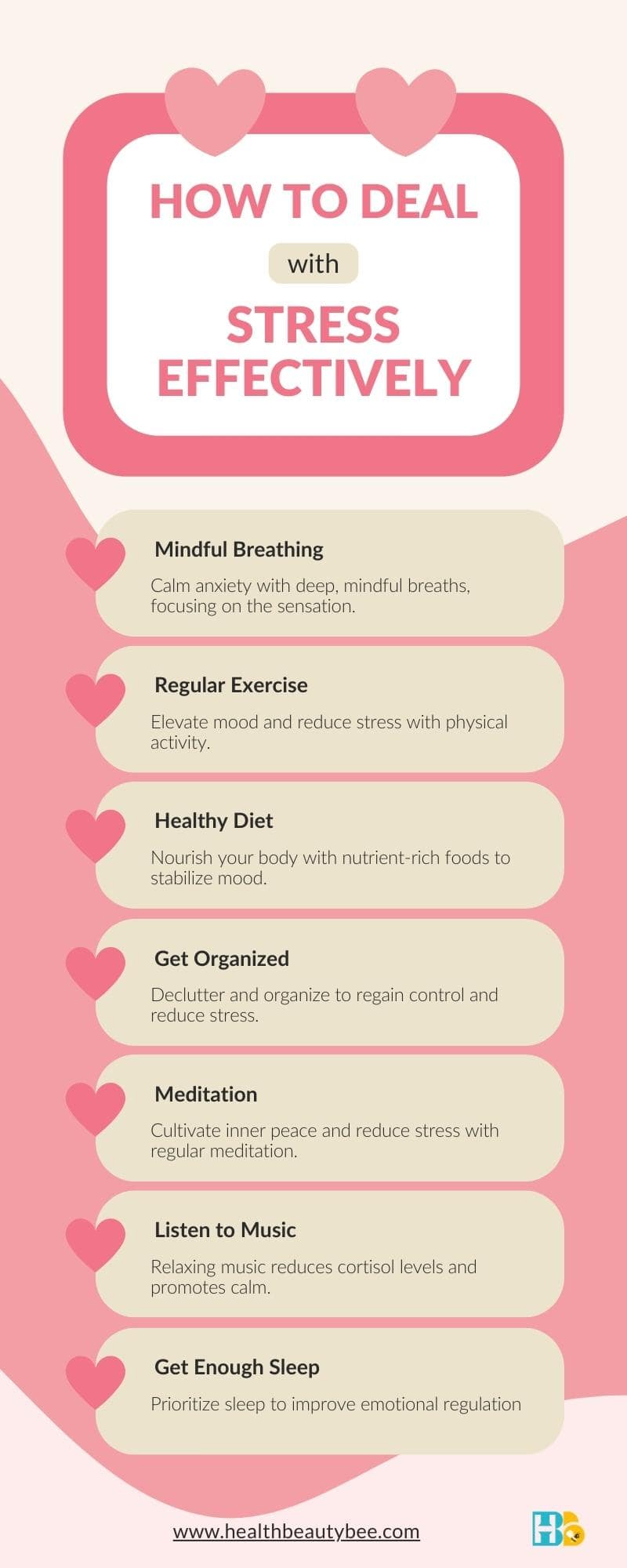Are you looking for natural ways to manage stress and anxiety? In today’s fast-paced world, many individuals struggle with these common mental health challenges. The pressures of daily life can take a toll on our mental and emotional well-being, affecting our overall happiness and quality of life. Fortunately, there are effective strategies that can help you find relief and how to treat anxiety naturally.
14 Ways to Manage Stress and Treat Anxiety
In this article, we will explore how to manage stress and anxiety naturally, and various strategies and techniques that can help treat, deal with, get rid of, and stop anxiety.
1. Practice Mindful Breathing
Practice Mindful Breathing is a powerful technique to treat anxiety. By focusing your attention on your breath, you can calm your mind and create a sense of relaxation.
- Simply take slow, deep breaths, paying attention to the sensation of your breath entering and leaving your body.
This mindfulness practice can help reduce anxiety symptoms and promote a greater sense of calm and well-being, making it an effective natural therapy for treating anxiety and managing stress.
2. Exercise Regularly
Regular exercise is a natural and effective way to manage stress. Engaging in physical activity that elevates mood and reduce stress levels. Whether it’s
- going for a brisk walk,
- participating in a group exercise class, or
- practicing yoga,
- incorporating regular exercise into your routine
can significantly improve your mental well-being and provide a natural remedy for managing stress.
3. Maintain a Healthy Diet
Maintaining a healthy diet plays a crucial role in treating anxiety and managing stress. Furthermore, consuming nutrient-rich foods can provide the necessary vitamins and minerals to support optimal mental health.
Incorporating whole grains, fruits, vegetables, lean proteins, and healthy fats into your meals can help stabilize your mood and energy levels. Consequently, by nourishing your body, you can effectively manage stress naturally.
4. Get Organized
Getting organized is an excellent way to deal with anxiety and reduce stress. When our lives are cluttered and disorganized, it can create a sense of overwhelm and contribute to feelings of anxiety.
- By decluttering your physical space, organizing your tasks and priorities, and creating a systematic approach to managing your responsibilities, you can regain a sense of control and reduce stress levels.
- Breaking tasks into manageable chunks and establishing routines can also help alleviate anxiety by providing structure and promoting a more relaxed state of mind.
5. Meditation
Meditation is a powerful tool to get rid of anxiety, manage stress. By sitting in a quiet space and focusing your attention on your breath or a specific mantra, you can calm your mind and cultivate a sense of inner peace.
Regular meditation practice has been proven to reduce stress levels and promote overall well-being. Taking a few minutes each day to meditate can be a transformative practice to manage stress.
5. Listen to Music
Listening to music can be a simple and effective way to manage stress. Listening to relaxing music can reduce cortisol levels and slow down the heart rate, promoting feelings of calm and relaxation.
Whether it’s classical, instrumental, or your favorite genre, taking time to listen to music that you enjoy can be a powerful way to relieve stress.
Incorporating music into your daily routine, such as during your commute or while completing tasks, can be an enjoyable and effective way to manage stress levels.
6. Limit Caffeine Intake
Caffeine is a stimulant that can increase heart rate and contribute to feelings of nervousness and tension. Consuming too much caffeine can also disrupt sleep patterns, further exacerbating stress levels.
Reducing caffeine intake or switching to decaf alternatives can help stabilize nervous system activity and alleviate anxiety symptoms.
7. Get enough sleep
Getting enough sleep is essential to get rid of anxiety. When we are sleep-deprived, our bodies and minds are more vulnerable to stress triggers. Prioritizing a good night’s sleep can help regulate our emotions and improve our ability to cope with stressors.
Creating a relaxing bedtime routine, and ensuring a comfortable sleep environment can all contribute to better sleep quality, which leads to reduced anxiety and improved stress management.
8. Light a Candle
The soft, warm glow of a candle can create a calming ambiance and help soothe the mind. Aromatherapy candles infused with calming scents like lavender, chamomile, and vanilla can have additional relaxing effects. Then, taking a few moments to light a candle, focus on its gentle flame, and breathe deeply can be an effective practice to manage stress.
9. Laugh More
Making an effort to laugh more can be a helpful way to reduce stress. Laughter has numerous benefits. It can also relax tense muscles and improve oxygen flow, promoting a sense of calm.
Incorporating laughter into your routine, whether through watching a comedy, spending time with funny friends, or finding humor in everyday situations, can contribute to a lighter, more positive outlook and reduce stress levels.
10. Learn to Say No
Setting boundaries and learning to say no are effective ways to treat anxiety. By establishing clear limits and prioritizing self-care, individuals can reduce feelings of overwhelm and prevent burnout. Setting boundaries helps to create a sense of control and balance in life, while saying no allows individuals to protect their time and energy.
11. Get Outside
Engaging with nature and fresh air can help calm the mind, reduce cortisol levels, and promote relaxation. Whether it’s a walk in the park, hiking, or simply enjoying a picnic, getting outside provides a much-needed break from daily stressors.
Incorporating regular outdoor activities into your routine can greatly improve your mental well-being and overall quality of life.
12. Spent time with family and friends
Spending quality time with family and friends can be instrumental in treating anxiety and managing stress.
- Engaging in positive social interactions and nurturing relationships creates a sense of connection, support, and belonging.
- Furthermore, sharing laughter, engaging in meaningful conversations, and participating in activities together can help reduce anxiety levels, provide emotional support, and bring about a sense of calmness and relaxation.
- Prioritizing quality time with loved ones is an effective way to manage stress in everyday life.
13. Practice Time Management
Effective time management is an essential tool in treating anxiety and managing stress. Moreover, by organizing tasks, setting priorities, and allocating sufficient time for each activity, individuals can feel a sense of control and reduce the overwhelming feeling that often accompanies anxiety and stress.
Incorporating techniques such as creating schedules, prioritizing important tasks, and practicing efficient work habits can significantly improve productivity. Moreover, these practices can reduce anxiety levels and provide a greater sense of accomplishment and peace of mind.
14. Practice Gratitude
Practicing gratitude is an effective way to deal with anxiety and reduce stress. By focusing on the positive aspects of life, individuals can develop a sense of optimism, improve their mood, and lower stress levels.
Engaging in activities such as gratitude journaling, mindfulness, and appreciation exercises, promotes a positive mindset and helps individuals find joy and satisfaction in everyday life.
Infographic: How to Treat Anxiety? 14 Best Ways to Manage Stress Naturally
Save this infographic in high-quality PDF format
In conclusion, managing stress and treating anxiety is crucial for maintaining overall well-being. Moreover, by implementing the 14 strategies discussed in this blog, individuals can take control of their mental health and create a more balanced and fulfilling life. Remember, it is important to find what works best for you and make self-care a priority. By prioritizing mental well-being, you can achieve a happier and healthier life.












